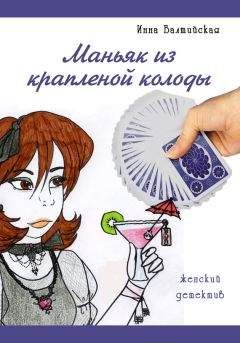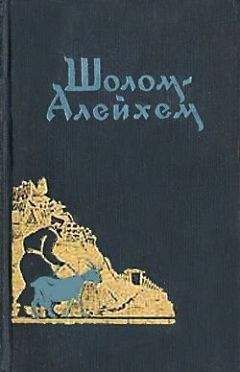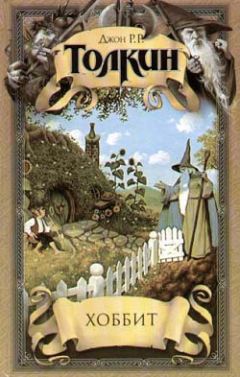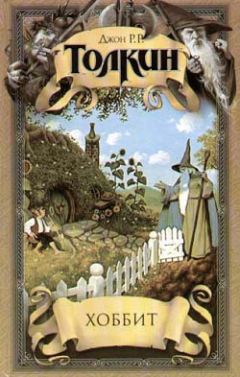Джон Толкиен - Английский язык с Дж. Р. Р. Толкиеном. Хоббит
allow [ǝˈlaʋ] interrupted [ɪntǝˈrʌptɪd] engine [ˈendʒɪn]
This was Thorin’s style. He was an important dwarf. If he had been allowed, he would probably have gone on like this until he was out of breath, without telling any one there anything that was not known already. But he was rudely interrupted. Poor Bilbo couldn’t bear it any longer. At may never return he began to feel a shriek coming up inside, and very soon it burst out like the whistle of an engine coming out of a tunnel. All the dwarves sprang on knocking over the table. Gandalf struck a blue light on the end of his magic staff, and in its firework glare the poor little hobbit could be seen kneeling on the hearth-rug, shaking like a jelly that was melting. Then he fell flat on the floor, and kept on calling out “struck by lightning, struck by lightning!” over and over again; and that was all they could get out of him for a long time. So they took him and laid him out of the way on the drawing-room sofa with a drink at his elbow, and they went back to their dark business.
“Excitable little fellow (легко возбудимый паренек: «малыш»), ” said Gandalf, as they sat down again (сказал Гэндальф, когда они снова расселись). “Gets funny queer fits (случаются забавные странные припадки), but he is one of the best (но он — один из самых лучших), one of the best (один из самых лучших) — as fierce as a dragon in a pinch (такой же свирепый, как дракон в трудную минуту; pinch — щипок; тяготы, чрезвычайные обстоятельства). ”
If you have ever seen a dragon in a pinch (если вы когда-нибудь видели дракона в трудную минуту), you will realise (то вы ясно представите себе) that this was only poetical exaggeration (что это было лишь поэтическое преувеличение) applied to any hobbit (применительно к любому хоббиту), even to Old Took’s great-granduncle Bullroarer (даже к прадядюшке Старого Тука /по имени/ Трещотка; bull — бык; roarer — горлопан, крикун), who was so huge (который был такой огромный) (for a hobbit (для хоббита)) that he could ride a horse (что мог ездить верхом на лошади). He charged the ranks of the goblins of Mount Gram (он набросился на шеренги гоблинов из Маунт—Грэма; to charge — нагружать, обременять; /воен. / атаковать) in the Battle of the Green Fields (в Битве на Зеленых Полях), and knocked their king Golfimbul’s head (и сшиб голову их короля Гольфимбуля) clean off (подчистую) with a wooden club (деревянной дубинкой). It sailed a hundred yards through the air (она пролетела сотню ярдов по воздуху; to sail — плыть /под парусом/, парить) and went down a rabbit hole (и опустилась в кроличью нору), and in this way the battle was won (и таким образом эта битва была выиграна; to win — выигрывать) and the game of Golf invented (и игра в Гольф была изобретена) at the same moment (в тот же самый момент).
excitable [ɪkˈsaɪtǝb (ǝ) l] exaggeration [ɪɡzædʒǝˈreɪʃ (ǝ) n] invent [ɪnˈvent]
“Excitable little fellow, ” said Gandalf, as they sat down again. “Gets funny queer fits, but he is one of the best, one of the best — as fierce as a dragon in a pinch. ”
If you have ever seen a dragon in a pinch, you will realise that this was only poetical exaggeration applied to any hobbit, even to Old Took’s great — granduncle Bullroarer, who was so huge (for a hobbit) that he could ride a horse. He charged the ranks of the goblins of Mount Gram in the Battle of the Green Fields, and knocked their king Golfimbul’s head clean off with a wooden club. It sailed a hundred yards through the air and went down a rabbit hole, and in this way the battle was won and the game of Golf invented at the same moment.
In the meanwhile, however (тем временем, однако), Bullroarer’s gentler descendant (более кроткий потомок Трещотки) was reviving in the drawing — room (приходил в себя в гостиной). After a while and a drink (спустя какое-то время, и /выпив/ стаканчик) he crept nervously (он нервозно прокрался) to the door of the parlour (к двери небольшого зала). This is what he heard (и вот что он услышал), Gloin speaking (говорил Глойн):
“Humph (хм)!” (or some snort (или другое какое фырканье) more or less like that (более или менее похожее на это)). “Will he do, do you think (подойдет ли он, как вы думаете)? It is all very well for Gandalf to talk (легко Гэндальфу говорить; it's all very well — это все очень хорошо = /ирон. / легко сказать) about this hobbit being fierce (о том, что этот хоббит свирепый), but one shriek like that (но одного пронзительного крика, подобного этому) in a moment of excitement (в момент возбуждения) would be enough (будет достаточно) to wake the dragon (чтобы разбудить дракона) and all his relatives (и всех его сородичей: «родственников»), and kill the lot of us (и убить всех нас скопом). I think (мне кажется) it sounded more like fright (он звучал больше как /крик/ испуга) than excitement (а не возбуждения)! In fact (на самом-то деле), if it had not been for the sign on the door (если бы не тот самый знак на двери), I should have been sure (я был бы полностью уверен) we had come to the wrong house (что мы пришли в не тот дом; wrong — неправильный, ошибочный). As soon as I clapped eyes on the little fellow (как только я увидел этого коротышку: «малыша»; toclap—хлопать) bobbing and puffing on the mat (подпрыгивающего и пыхтящего на коврике /у двери/), I had my doubts (я засомневался: «имел свои сомнения»). He looks more like a grocer (он больше похож: «выглядит как» на бакалейщика) — than a burglar (чем на ночного грабителя)!”
descendant [dɪˈsendǝnt] nervous [ˈnǝ: vǝs] parlour [ˈpɑ: lǝ] doubt [daʋt]
In the meanwhile, however, Bullroarer’s gentler descendant was reviving in the drawing-room. After a while and a drink he crept nervously to the door of the parlour. This is what he heard, Gloin speaking:
“Humph!” (or some snort more or less like that). “Will he do, do you think? It is all very well for Gandalf to talk about this hobbit being fierce, but one shriek like that in a moment of excitement would be enough to wake the dragon and all his relatives, and kill the lot of us. I think it sounded more like fright than excitement! In fact, if it bad not been for the sign on the door, I should have been sure we had come to the wrong house. As soon as I clapped eyes on the little fellow bobbing and puffing on the mat, I had my doubts. He looks more like a grocer than a burglar!”
Then Mr. Baggins turned the handle and went in (тогда-то мистер Бэггинс повернул ручку /двери/ и вошел). The Took side had won (порода Тука одержала победу; side—сторона). He suddenly felt (он внезапно почувствовал) he would go without bed and breakfast (что он обойдется без сна и еды: «кровати и завтрака») to be thought fierce (чтобы о нем думали, как о свирепом). As for little fellow bobbing on the mat (что же касается /фразы о/ коротышке, прыгающем на коврике) it almost made him really fierce (то она почти что сделала его на самом деле свирепым = разгневала его). Many a time afterwards (много раз в последствии) the Baggins part (Бэггинсова часть /хоббита/) regretted what he did now (пожалела о том, что он сделал сейчас), and he said to himself (и он говорил себе): “Bilbo, you were a fool (Бильбо, ты был дураком); you walked right in (ты вошел прямо в /это дело/) and put your foot in it (и сам же сел в калошу; to put one's foot in /into/ it — сплоховать, попасть впросак: «сунуть свою ногу в это»). ”
“Pardon me (извините), ” he said, “if I have overheard (если я нечаянно подслушал) words that you were saying (слова, которые вы говорили). I don’t pretend to understand (я не делаю вид, будто понимаю) what you are talking about (о чем вы говорите), or your reference to burglars (или о вашем упоминании о ночных грабителях), but I think (но я думаю) I am right in believing (что я прав, полагая; to believe — верить, доверять) ” (this is what he called (это было то, что он называл) being on his dignity (вести себя с достоинством)) “that you think (что вы считаете) I am no good (меня ни на что не годным). I will show you (я вам покажу). I have no signs on my door (у меня нет никаких знаков на двери), it was painted a week ago (она была покрашена неделю назад), and I am quite sure (и я совершенно уверен) you have come to the wrong house (что вы пришли не в тот дом: «в неправильный дом»). As soon as I saw your funny faces (как только я увидел ваши забавные физиономии; soon — скоро, рано) on the door-step (на пороге), I had my doubts (я засомневался). But treat it as the right one (но считайте, что это тот дом; right — правильный). Tell me what you want done (скажите мне, что вы хотите, чтобы было сделано), and I will try it (и я попытаюсь), if I have to walk (/даже/ если я должен буду пройти) from here to the East of East (от сюда до самого Восточного Востока) and fight the wild Were-worms (и сражаться с дикими Оборотнями: «людьми-змеями»; worm — червяк; /арх. / дракон) in the Last Desert (в Крайней Пустыне; last — последний). I had a great-great-great — granduncle once (был у меня когда-то давно двоюродный пра-пра-пра—дедушка; uncle — дядя), Bullroarer Took (Трещотка «Бычий Рев» Тук), and (и) —“




